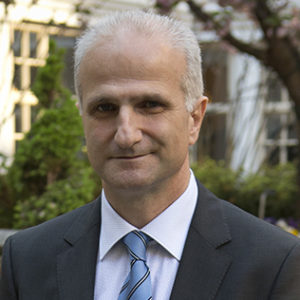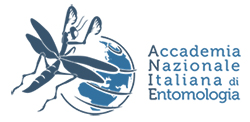
Francesco Pennacchio
f.pennacchio@unina.it
BIOGRAFIA
Professore Ordinario di Entomologia all’Università di Napoli (Italia) e Visiting Professor alla Newcastle University (UK), ha conseguito il Dottorato di Ricerca in Entomologia nel 1989 presso l’Università di Napoli Federico II, e, dal 1989 al 1991, è stato research associate al Department of Entomology, Texas A&M University, College Station, TX, U.S.A. Il nucleo centrale dei suoi interessi di ricerca è rappresentato dallo studio della fisiologia molecolare delle interazioni multitrofiche negli insetti e dalle biotecnologie di controllo che traggono ispirazione da queste conoscenze. In particolare, la sua attività scientifica è rivolta allo studio dell’immunità degli insetti, delle strategie di immunosoppressione adottate da parassiti e patogeni, e degli aspetti funzionali che regolano l’impatto degli stress ambientali sull’immunocompetenza degli insetti. Nel 2014 ha ricevuto il Premio Cozzarelli dalla National Academy of Sciences U.S.A. per la sua ricerca sui meccanismi molecolari attraverso cui i neonicotinoidi influenzano negativamente la risposta immunitaria degli insetti e promuovono la replicazione di patogeni virali presenti in api con infezioni asintomatiche. E’ Presidente dell’Accademia Nazionale Italiana di Entomologia, dal 2012 al 2021 è stato Presidente della Società Entomologica Italiana, è membro del Council for the International Congresses of Entomology, è membro del Praesidium of the European Congresses of Entomology, e, nel 2022, è stato eletto membro dell’EMBO, in riconoscimento dei suoi rilevanti contributi di ricerca nel campo delle scienze della vita.
Di Lelio, I., Forni, G., Magoga, G., Brunetti, M., Bruno, D., Becchimanzi, A., De Luca, M.G., Sinno, M., Barra, E., Bonelli, M., Frusciante, S., Diretto, G., Digilio, M.C., Woo, S.L., Tettamanti, G., Rao, R., Lorito, M., Casartelli, M., Montagna, M., Pennacchio, F.* (2023) A soil fungus confers plant resistance against a phytophagous insect by disrupting the symbiotic role of its gut microbiota. Proceedings of the National Academy of Sciences of the United States of America, 120 (10): e2216922120. DOI: https://dx.doi.org/10.1073/pnas.2216922120
Annoscia, D., Di Prisco, G., Becchimanzi, A., Caprio, E., Frizzera, D., Linguadoca, A., Nazzi, F., Pennacchio, F.* (2020) Neonicotinoid Clothianidin reduces honey bee immune response and contributes to Varroa mite proliferation. Nature Communications, 11 (1): 5887. DOI: https://dx.doi.org/10.1038/s41467-020-19715-8
Caccia, S., Di Lelio, I., La Storia, A., Marinelli, A., Varricchio, P., Franzetti, E., Banyuls, N., Tettamanti, G., Casartelli, M., Giordana, B., Ferré, J., Gigliotti, S., Ercolini, D., Pennacchio, F.* (2016). Midgut microbiota and host immunocompetence underlie Bacillus thuringiensis killing mechanism. Proceedings of the National Academy of Sciences of the United States of America, 113 (34): 9486-9491. DOI: https://dx.doi.org/10.1073/pnas.1521741113
Di Prisco, G., Annoscia, D., Margiotta, M., Ferrara, R., Varricchio, P., Zanni, V., Caprio, E., Nazzi, F., Pennacchio, F.* (2016) A mutualistic symbiosis between a parasitic mite and a pathogenic virus undermines honey bee immunity and Health. Proceedings of the National Academy of Sciences of the United States of America, 113 (12): 3203-3208. DOI: https://doi.org/10.1073/pnas.1523515113
Di Prisco, G., Cavaliere, V., Annoscia, D., Varricchio, P., Caprio, E., Nazzi, F., Gargiulo, G., Pennacchio, F.* (2013) Neonicotinoid clothianidin adversely affects insect immunity and promotes replication of a viral pathogen in honey bees. Proceedings of the National Academy of Sciences of the United States of America, 110 (46): 18466-18471. DOI: https://dx.doi.org/10.1073/pnas.1314923110
Professor of Entomology at the University of Napoli Federico II (Italy) and Visiting Professor at Newcastle University (UK), in 1989 he received a PhD in Entomology at the University of Napoli Federico II, and, from 1989 to 1991, he was research associate at the Department of Entomology, Texas A&M University, College Station, TX, U.S.A. The study of the molecular physiology of insect multitrophic interactions is at the core of his research interests, along with biotechnologies for insect control that can be developed based on this knowledge. His work particularly focuses on insect immunity and immunosuppression strategies by parasites and pathogens, and on how environmental stress can alter insect immunocompetence. In 2014 he was awarded the Cozzarelli Prize by the National Academy of Sciences of U.S.A. for his work on elucidating the molecular mechanism through which the neonicotinoids adversely affect the insect immune response and promote replication of a viral pathogen in honeybees bearing covert infections. He currently serves as President of the Italian National Academy of Entomology, from 2012 to 2021 was President of the Italian Entomological Society, is member of the Council for International Congresses of Entomology, is member of the Praesidium of the European Congresses of Entomology, and, in 2022, was elected as EMBO member in recognition of outstanding contributions to life science research.
Di Lelio, I., Forni, G., Magoga, G., Brunetti, M., Bruno, D., Becchimanzi, A., De Luca, M.G., Sinno, M., Barra, E., Bonelli, M., Frusciante, S., Diretto, G., Digilio, M.C., Woo, S.L., Tettamanti, G., Rao, R., Lorito, M., Casartelli, M., Montagna, M., Pennacchio, F.* (2023) A soil fungus confers plant resistance against a phytophagous insect by disrupting the symbiotic role of its gut microbiota. Proceedings of the National Academy of Sciences of the United States of America, 120 (10): e2216922120. DOI: https://dx.doi.org/10.1073/pnas.2216922120
Annoscia, D., Di Prisco, G., Becchimanzi, A., Caprio, E., Frizzera, D., Linguadoca, A., Nazzi, F., Pennacchio, F.* (2020) Neonicotinoid Clothianidin reduces honey bee immune response and contributes to Varroa mite proliferation. Nature Communications, 11 (1): 5887. DOI: https://dx.doi.org/10.1038/s41467-020-19715-8
Caccia, S., Di Lelio, I., La Storia, A., Marinelli, A., Varricchio, P., Franzetti, E., Banyuls, N., Tettamanti, G., Casartelli, M., Giordana, B., Ferré, J., Gigliotti, S., Ercolini, D., Pennacchio, F.* (2016). Midgut microbiota and host immunocompetence underlie Bacillus thuringiensis killing mechanism. Proceedings of the National Academy of Sciences of the United States of America, 113 (34): 9486-9491. DOI: https://dx.doi.org/10.1073/pnas.1521741113
Di Prisco, G., Annoscia, D., Margiotta, M., Ferrara, R., Varricchio, P., Zanni, V., Caprio, E., Nazzi, F., Pennacchio, F.* (2016) A mutualistic symbiosis between a parasitic mite and a pathogenic virus undermines honey bee immunity and Health. Proceedings of the National Academy of Sciences of the United States of America, 113 (12): 3203-3208. DOI: https://doi.org/10.1073/pnas.1523515113
Di Prisco, G., Cavaliere, V., Annoscia, D., Varricchio, P., Caprio, E., Nazzi, F., Gargiulo, G., Pennacchio, F.* (2013) Neonicotinoid clothianidin adversely affects insect immunity and promotes replication of a viral pathogen in honey bees. Proceedings of the National Academy of Sciences of the United States of America, 110 (46): 18466-18471. DOI: https://dx.doi.org/10.1073/pnas.1314923110
